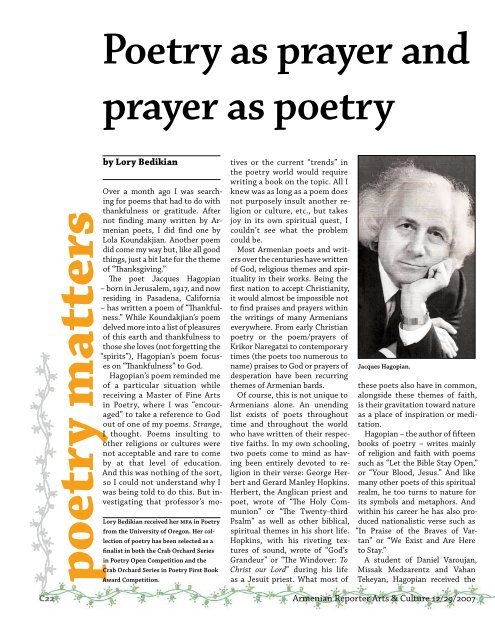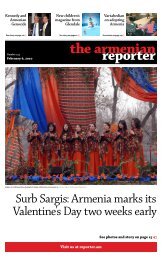Pop princess Sirusho - Armenian Reporter
Pop princess Sirusho - Armenian Reporter
Pop princess Sirusho - Armenian Reporter
Create successful ePaper yourself
Turn your PDF publications into a flip-book with our unique Google optimized e-Paper software.
poetry matters by<br />
Poetry as prayer and<br />
prayer as poetry<br />
Lory Bedikian<br />
Over a month ago I was searching<br />
for poems that had to do with<br />
thankfulness or gratitude. After<br />
not finding many written by <strong>Armenian</strong><br />
poets, I did find one by<br />
Lola Koundakjian. Another poem<br />
did come my way but, like all good<br />
things, just a bit late for the theme<br />
of “Thanksgiving.”<br />
The poet Jacques Hagopian<br />
– born in Jerusalem, 1917, and now<br />
residing in Pasadena, California<br />
– has written a poem of “Thankfulness.”<br />
While Koundakjian’s poem<br />
delved more into a list of pleasures<br />
of this earth and thankfulness to<br />
those she loves (not forgetting the<br />
“spirits”), Hagopian’s poem focuses<br />
on “Thankfulness” to God.<br />
Hagopian’s poem reminded me<br />
of a particular situation while<br />
receiving a Master of Fine Arts<br />
in Poetry, where I was “encouraged”<br />
to take a reference to God<br />
out of one of my poems. Strange,<br />
I thought. Poems insulting to<br />
other religions or cultures were<br />
not acceptable and rare to come<br />
by at that level of education.<br />
And this was nothing of the sort,<br />
so I could not understand why I<br />
was being told to do this. But investigating<br />
that professor’s mo<br />
Lory Bedikian received her MFA in Poetry<br />
from the University of Oregon. Her col-<br />
lection of poetry has been selected as a<br />
finalist in both the Crab Orchard Series<br />
in Poetry Open Competition and the<br />
Crab Orchard Series in Poetry First Book<br />
Award Competition.<br />
tives or the current “trends” in<br />
the poetry world would require<br />
writing a book on the topic. All I<br />
knew was as long as a poem does<br />
not purposely insult another religion<br />
or culture, etc., but takes<br />
joy in its own spiritual quest, I<br />
couldn’t see what the problem<br />
could be.<br />
Most <strong>Armenian</strong> poets and writers<br />
over the centuries have written<br />
of God, religious themes and spirituality<br />
in their works. Being the<br />
first nation to accept Christianity,<br />
it would almost be impossible not<br />
to find praises and prayers within<br />
the writings of many <strong>Armenian</strong>s<br />
everywhere. From early Christian<br />
poetry or the poem/prayers of<br />
Krikor Naregatzi to contemporary<br />
times (the poets too numerous to<br />
name) praises to God or prayers of<br />
desperation have been recurring<br />
themes of <strong>Armenian</strong> bards.<br />
Of course, this is not unique to<br />
<strong>Armenian</strong>s alone. An unending<br />
list exists of poets throughout<br />
time and throughout the world<br />
who have written of their respective<br />
faiths. In my own schooling,<br />
two poets come to mind as having<br />
been entirely devoted to religion<br />
in their verse: George Herbert<br />
and Gerard Manley Hopkins.<br />
Herbert, the Anglican priest and<br />
poet, wrote of “The Holy Communion”<br />
or “The Twentythird<br />
Psalm” as well as other biblical,<br />
spiritual themes in his short life.<br />
Hopkins, with his riveting textures<br />
of sound, wrote of “God’s<br />
Grandeur” or “The Windover: To<br />
Christ our Lord” during his life<br />
as a Jesuit priest. What most of<br />
Jacques Hagopian.<br />
these poets also have in common,<br />
alongside these themes of faith,<br />
is their gravitation toward nature<br />
as a place of inspiration or meditation.<br />
Hagopian – the author of fifteen<br />
books of poetry – writes mainly<br />
of religion and faith with poems<br />
such as “Let the Bible Stay Open,”<br />
or “Your Blood, Jesus.” And like<br />
many other poets of this spiritual<br />
realm, he too turns to nature for<br />
its symbols and metaphors. And<br />
within his career he has also produced<br />
nationalistic verse such as<br />
“In Praise of the Braves of Vartan”<br />
or “We Exist and Are Here<br />
to Stay.”<br />
A student of Daniel Varoujan,<br />
Missak Medzarentz and Vahan<br />
Tekeyan, Hagopian received the<br />
C22 <strong>Armenian</strong> <strong>Reporter</strong> Arts & Culture 12/29/2007

















